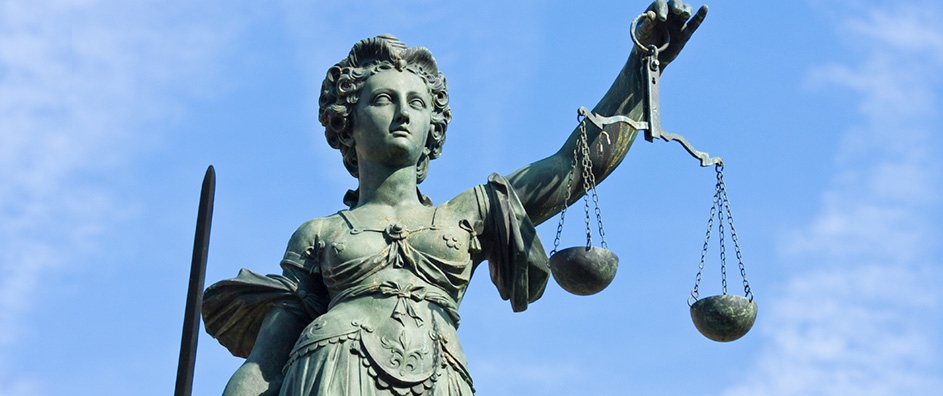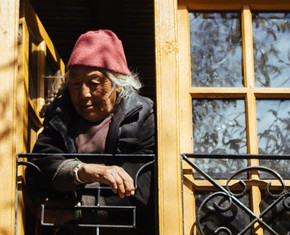The views expressed in our content reflect individual perspectives and do not represent the authoritative views of the Baha'i Faith.
The best beloved of all things in my sight is Justice. – Baha’u’llah, The Hidden Words, p. 3.
That which traineth the world is Justice, for it is upheld by two pillars, reward and punishment. –Baha’u’llah, Tablets of Baha’u’llah, p. 27.
In sum, the proper functioning of the body politic depends on justice and not forgiveness. – Abdu’l-Baha, Some Answered Questions, newly revised edition, p. 312.
The Baha’i teachings strongly advocate justice—but some people tend to confuse justice with vengeance. When one has suffered greatly at the hands of another, they often want to exact retribution and ensure the perpetrator faces similar torment in return. So although the Baha’i teachings emphasize the building of a just society, they also make clear that no punishment should ever seek revenge:
…the body politic has the right to preserve and protect. It holds no grudge and harbours no enmity towards the murderer, but chooses to imprison or punish him solely to ensure the protection of others. The purpose is not revenge but a punishment through which the body politic is protected. Otherwise, were the victim’s heirs and the community to forgive and return good for evil, the wrongdoers would never cease their onslaught and a murder would be committed at every moment—nay, bloodthirsty individuals would, like wolves, entirely destroy the flock of God. The body politic is not prompted by ill will in meting out its punishment; it acts without prejudice and does not seek to gratify a sense of vengeance. Its purpose in inflicting the punishment is to safeguard others and to prevent the future commission of such vile actions. – Abdu’l-Baha, Some Answered Questions, newly revised edition, pp. 310-311.
From this essentially spiritual perspective of oneness and collective unity—that the body politic, the people as a whole, have the right to protection from vicious predators—comes the Baha’i viewpoint on capital punishment. Although the Baha’i laws, meant for a future state of society, allow the death penalty, they do not make it mandatory:
Baha’u’llah has given death as the penalty for murder. However, He has permitted life imprisonment as an alternative. Both practices would be in accordance with His Laws. – Shoghi Effendi, quoted in The Most Holy Book, p. 204.
Some of the world’s nations have adopted this nuanced view already, by reserving the death penalty for exceptionally heinous crimes like the murder of children or special circumstances like war crimes and genocide; and by sentencing most capital criminals to sentences such as life without the possibility of parole. This optional death penalty law also gives justice systems the ability to better fit the punishment to the crime, rather than imposing a universally harsh or lenient pattern of sentencing.
What about the spiritual condition of the soul of a murderer? The Baha’i teachings say that God is just, that God is merciful. These statements are not mutually exclusive. As there exists life after death, or shall we say life after life, the Baha’i writings point out that exacting justice by executing a murderer may actually be a mercy to his or her spiritual condition:
As to the question regarding the soul of a murderer, and what his punishment would be, the answer given was that the murderer must expiate his crime: that is, if they put the murderer to death, his death is his atonement for his crime, and following the death, God in His justice will impose no second penalty upon him, for divine justice would not allow this. – Selections from the Writings of Abdu’l-Baha, p. 178.
However—all of this discussion presupposes a just system of jurisprudence, fair trials and equal treatment under the law. With continued effort, activism and advocacy, humanity will make progress toward those goals. But ideally—and well within the realm of possibility, if we follow the guidance for spiritual growth sent down by God through His messengers, and truly educate every human being—the question of punishment for crimes would eventually become a moot point:
…the body politic is engaged day and night in devising penal laws and in providing for ways and means of punishment. It builds prisons, acquires chains and fetters, and ordains places of exile and banishment, seeking thereby to reform the criminal, whereas in reality this only brings about the degradation of morals and the subversion of character. The body politic should instead strive night and day, bending every effort to ensure that souls are properly educated, that they progress day by day, that they advance in science and learning, that they acquire praiseworthy virtues and laudable manners, and that they forsake violent behaviour, so that crimes might never occur. At the present time the contrary prevails: The body politic is ever seeking to strengthen penal laws and securing means of punishment, instruments of death and chastisement, and places of imprisonment and exile, and then waiting for crimes to be committed. This has a most detrimental effect.
But if the masses were educated so that knowledge and learning increased day by day, understanding was broadened, perceptions were refined, morals were rectified and manners reformed—in a word, that progress was made with respect to every degree of perfection—then the occurrence of crime would subside… As ignorance is the root cause of crime, the more knowledge and learning advance, the less crime will be committed. – Abdu’l-Baha, Some Answered Questions, newly revised version, pp. 312-313.
The Baha’i teachings stress justice—but also emphasize the building of a divine civilization, where love and kindness prevail and crime becomes a rarity:
Divine civilization, however, so traineth every member of society that no one, with the exception of a negligible few, will undertake to commit a crime. There is thus a great difference between the prevention of crime through measures that are violent and retaliatory, and so training the people, and enlightening them, and spiritualizing them, that without any fear of punishment or vengeance to come, they will shun all criminal acts. They will, indeed, look upon the very commission of a crime as a great disgrace and in itself the harshest of punishments. They will become enamoured of human perfections, and will consecrate their lives to whatever will bring light to the world and will further those qualities which are acceptable at the Holy Threshold of God.
See then how wide is the difference between material civilization and divine. With force and punishments, material civilization seeketh to restrain the people from mischief, from inflicting harm on society and committing crimes. But in a divine civilization, the individual is so conditioned that with no fear of punishment, he shunneth the perpetration of crimes, seeth the crime itself as the severest of torments, and with alacrity and joy, setteth himself to acquiring the virtues of humankind, to furthering human progress, and to spreading light across the world. – Selections from the Writings of Abdu’l-Baha, pp. 132-133.
















Comments
Sign in or create an account
Continue with Googleor